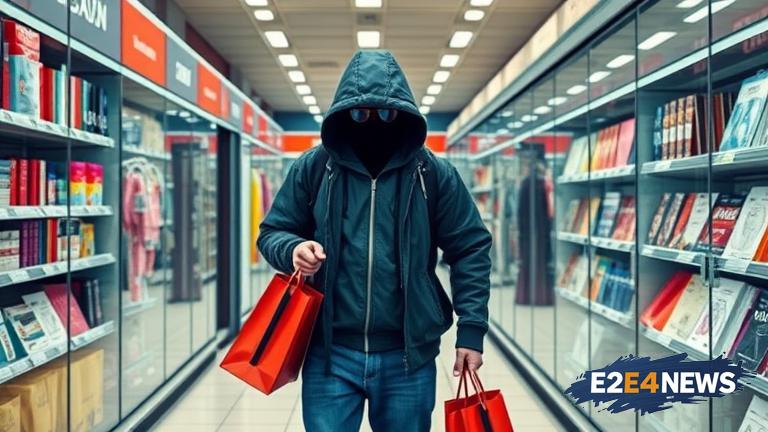The UK is grappling with a shoplifting epidemic, with security experts and retailers sounding the alarm over the soaring number of thefts. According to recent statistics, shoplifting has increased by a staggering 20% over the past year, with thieves becoming more brazen and violent in their pursuit of stolen goods. The rise in shoplifting has been attributed to a combination of factors, including the economic downturn, cuts to police funding, and the ease of selling stolen items online. Security experts warn that the situation is spiraling out of control, with many retailers feeling helpless in the face of the escalating thefts. The problem is not limited to small, independent stores, with large chain retailers also falling victim to the shoplifting scourge. In fact, many major retailers have reported a significant increase in thefts, with some stores experiencing losses of up to £10,000 per week. The impact of shoplifting is not just financial, with many retailers also reporting a rise in violent incidents and intimidation of staff. In some cases, thieves have even resorted to using violence and intimidation to escape with stolen goods, leaving staff and customers shaken. The police have come under fire for their handling of shoplifting cases, with many retailers feeling that they are not taking the issue seriously enough. In response to the criticism, police chiefs have pledged to increase patrols and crackdown on shoplifting, but security experts warn that more needs to be done to address the root causes of the problem. One of the main challenges facing retailers is the ease with which stolen goods can be sold online, with many thieves using social media platforms and online marketplaces to fence their stolen merchandise. To combat this, retailers are calling for greater cooperation between law enforcement and online platforms to crack down on the sale of stolen goods. Meanwhile, security experts are urging retailers to invest in more robust security measures, including CCTV cameras, alarms, and security guards. However, many small retailers feel that they cannot afford the cost of these measures, leaving them vulnerable to theft. The government has come under pressure to take action to address the shoplifting crisis, with many MPs calling for tougher sentences for thieves and greater support for retailers. In response, the government has pledged to increase funding for crime prevention initiatives and to work with retailers to develop more effective strategies for tackling shoplifting. Despite these efforts, security experts warn that the shoplifting epidemic will not be easily solved, and that it will require a sustained effort from retailers, law enforcement, and government to bring the problem under control. The rise in shoplifting has also had a significant impact on local communities, with many residents feeling that the increase in thefts is a sign of a broader decline in social cohesion and respect for the law. To address this, community leaders are calling for greater investment in youth programs and community initiatives to help tackle the root causes of shoplifting. In conclusion, the UK’s shoplifting epidemic is a complex and multifaceted problem that requires a comprehensive and sustained response from retailers, law enforcement, and government. By working together, it is possible to bring the problem under control and create safer, more secure shopping environments for everyone. The situation is being closely monitored by security experts, retailers, and law enforcement, who are all working together to develop effective strategies for tackling the shoplifting scourge. As the situation continues to evolve, one thing is clear: the UK’s shoplifting epidemic will not be easily solved, and it will require a long-term commitment to addressing the root causes of the problem. The economic and social impacts of shoplifting are far-reaching, and it is essential that policymakers and law enforcement take a proactive approach to addressing the issue. By doing so, it is possible to create a safer, more secure shopping environment for everyone, and to help tackle the broader social and economic challenges that are driving the shoplifting epidemic.
